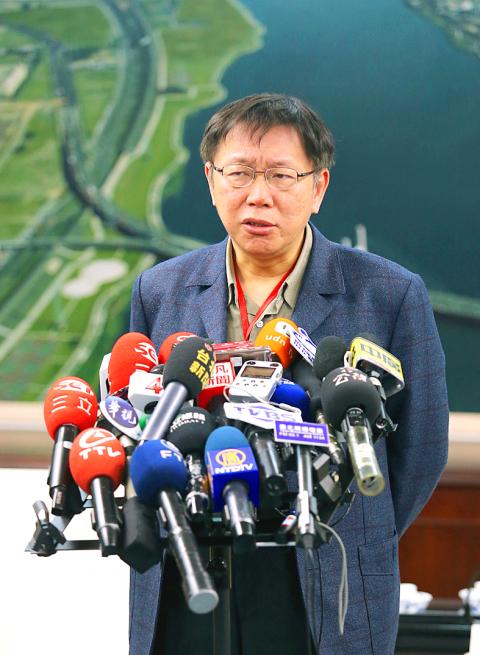The Taipei City Government will not accept threats from corporations, Taipei Mayor Ko Wen-je (柯文哲) said yesterday after Hon Hai Group (鴻海集團) stopped construction of the Syntrend Creative Park (三創園區).
“I strongly disagree with spending millions in advertisements to send a message to the city government,” Ko said. “The city government will not take threats from corporations.”
Hon Hai yesterday took out a half-page ad on the front pages of six major Chinese-language newspapers, following claims by Taipei city councilors that the NT$1 billion (US$32 million) 50-year lease the firm is set to pay for the site was too low.

Photo: CNA
In the ad, the firm said that the reasonableness and legality of its bid would “withstand any test,” calling on the city government to publicize all documentation related to the bidding process within 48 hours. It also announced that construction at the site would cease until the city government determines the legality of the bidding process.
Hon Hai’s ad follows controversy caused by several Taipei development projects which were outsourced to private contractors under previous administrations, with Ko promising to re-examine unreasonable contract terms.
”How could the corporation be so completely arrogant?” asked Ko rhetorically in response to the firm’s ad, adding that the corporation had acted as if “the country is controlled by corporations.”
“How could a corporation use this tone to speak to the government,” he said, adding that the city government would investigate the case at its own pace, while taking legal measures if the firm ceases construction.
“There’s no way all the documents can be publicized in 48 hours,” Taipei City Government Department of Finance Commissioner Su Jain-rong (蘇建榮) said, adding that the documents would have to be checked to ensure that no corporate secrets were released.
He added that all related documentation would be sent to the Clean Government Commission for evaluation when it has been established.
Ko said yesterday that the Clean Government Commission would be established this week, with specific details due to be announced today.
“As we’ve been in the process of dealing with the aftermath [of the previous administration], we’ve uncovered many problems, but we’re still unclear as to the cause,” Ko said, in response to questions over whether he was seeking to speed up the investigation into possible corruption cases.
The commission was originally due to be established in March.
The Syntrend Creative Park is being constructed next to the Guanghua Digital Plaza (光華數位新天地) and was billed by the previous administration as a way to turn the electronics district into a “shopping heaven,” which would surpass Tokyo’s Akihabara District.
With construction on the main building already completed, the firm’s announcement will mainly effect construction of a skybridge to the neighboring plaza.
The city government required Syntrend to construct a skybridge following concerns that the new development would drain customers from the neighboring plaza.

TRAGEDY STRIKES TAIPEI: The suspect died after falling off a building after he threw smoke grenades into Taipei Main Station and went on a killing spree in Zhongshan A 27-year-old suspect allegedly threw smoke grenades in Taipei Main Station and then proceeded to Zhongshan MRT Station in a random killing spree that resulted in the death of the suspect and two other civilians, and seven injured, including one in critical condition, as of press time last night. The suspect, identified as a man surnamed Chang Wen (張文), allegedly began the attack at Taipei Main Station, the Taipei Fire Department said, adding that it received a report at 5:24pm that smoke grenades had been thrown in the station. One man in his 50s was rushed to hospital after a cardiac arrest

A car bomb killed a senior Russian general in southern Moscow yesterday morning, the latest high-profile army figure to be blown up in a blast that came just hours after Russian and Ukrainian delegates held separate talks in Miami on a plan to end the war. Kyiv has not commented on the incident, but Russian investigators said they were probing whether the blast was “linked” to “Ukrainian special forces.” The attack was similar to other assassinations of generals and pro-war figures that have either been claimed, or are widely believed to have been orchestrated, by Ukraine. Russian Lieutenant General Fanil Sarvarov, 56, head

SAFETY FIRST: Double the number of police were deployed at the Taipei Marathon, while other cities released plans to bolster public event safety Authorities across Taiwan have stepped up security measures ahead of Christmas and New Year events, following a knife and smoke bomb attack in Taipei on Friday that left four people dead and 11 injured. In a bid to prevent potential copycat incidents, police deployments have been expanded for large gatherings, transport hubs, and other crowded public spaces, according to official statements from police and city authorities. Taipei Mayor Chiang Wan-an (蔣萬安) said the city has “comprehensively raised security readiness” in crowded areas, increased police deployments with armed officers, and intensified patrols during weekends and nighttime hours. For large-scale events, security checkpoints and explosives

PUBLIC SAFETY: The premier said that security would be tightened in transport hubs, while President Lai commended the public for their bravery The government is to deploy more police, including rapid response units, in crowded public areas to ensure a swift response to any threats, President William Lai (賴清德) said yesterday after a knife attack killed three people and injured 11 in Taipei the previous day. Lai made the remarks following a briefing by the National Police Agency on the progress of the investigation, saying that the attack underscored the importance of cooperation in public security between the central and local governments. The attack unfolded in the early evening on Friday around Taipei Main Station’s M7 exit and later near the Taipei MRT’s Zhongshan